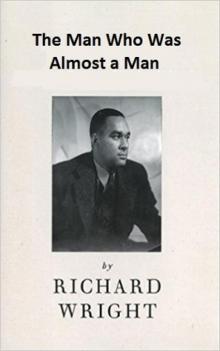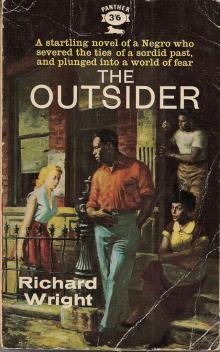- Home
- Richard Wright
The Outsider Page 9
The Outsider Read online
Page 9
The climax of their relationship came unexpectedly when the fat, black, religious landlady told Cross that, now that he was well, she could no longer permit Miss Dennis “actually living in your room like that. You know it ain’t decent. I want folks to respect my home”.
He told Gladys and she wept; he held her in his arms till she quieted.
“What must people think of me?” she moaned.
“To hell with that landlady,” Cross said.
“You think the others in the house feel the same way?”
“God, I don’t know.”
“I hope it doesn’t get to my job…”
His head reeled. He had not thought of that.
“I don’t want to leave you,” she told him.
“So; it’s settled.”
“But what are we going to do?” her voice echoed with ringing meanings.
It was the first time he had thought of marriage and it frightened him. But could he abandon her like that? He felt that if he had said that he was through with her, she would have accepted it, humbly. And it made him feel guilty. Well, would he ever find anyone better than she? He studied her face for a moment, then said impulsively to her: “Let’s get married.”
She had wept again. They rented an apartment and were furnishing it when they were married. Gladys had definite ideas about the home and Cross, having none, deferred to her. She argued gently that the thing to do was to buy a house and they did, arranging for the payments to fall due monthly.
The advent of the birth of their first child, a son, Cross, Junior, marked the commencement of protracted trouble. After safely transporting Gladys, who was in violent labor, to the hospital, Cross went out with a picked group of his Post Office cronies—Pink, Joe, and Booker—to stage a celebration which ended for his cronies after seven guzzling hours, but which, for Cross, extended itself for two whole days and nights during which he managed to pick up—he never knew exactly where or how—a brown-skinned girl who encouraged him to continue his “bat” as long as he had money to spend.
As strenuously as he could try, he could never recall quite clearly as to how he had come to bring the girl home with him and he never saw her after that to inquire. He suspected that he had drunkenly decided to do it after his money had run out; he had confused recollections of being ejected from bars for nonpayment of drinks. Before his nonstop carousal, Gladys had tried to reach him by telephoning from the hospital, and worried, she had come home with the baby and a nurse to find Cross unshaven, bleary-eyed and in bed with what Gladys chose to call his “whore”. Gladys’ reaction had been so savage and intense that she had wept for days, refused food, sat in deep moods of depression. Finally she demanded of Cross despairingly: “Aren’t you happy with me?”
“Sure,” he had said lightly, not wanting to think about it.
“Where did you meet the girl?”
“In a bar, I think…” he said vaguely.
“How in God’s name can you pick up a girl in a bar?”
In a nervous rage he had demanded: “Do you want to go? Or do you want me to go? I told you I was drunk, didn’t I?”
Gladys resisted an explanation that enthroned the demonical as a motive for his actions; she sensed the presence of irrational forces that could trample her and her home.
Despite this they remained together, but the naturalness and trust that had characterized their earlier relationship were gone. Cross hoped that Gladys had written off that shameful episode as an unrepeatable aberration which she would forget. But whenever he drank she would fling it at him and, in the end, a slow, mounting resentment rose in him toward her. More and more she sulked and, as he suffered her nagging, he felt increasingly walled off from her; but the more he felt it the more he sought to hide it, and finally there crept into his dealings with her a weird quality of irony. It first manifested itself in an innocent question: How could he help Gladys? And the moment he asked himself that question he knew that he did not love her and perhaps had never loved her…She had become for him an object of compassion. He was now haunted by the idea of riding some way to make her hate him. Her hatred would be a way of squaring their relationship, of curing her of her love for him, of setting her free as well as himself.
One winter when Cross was ill, Gladys nursed him and tried to reestablish over him her old emotional authority. It resulted in another pregnancy from which there issued two more sons, twins this time, Peter and Robert. Gladys had been hopeful, but not for long. Expenses increased and Cross’s salary was squeezed. Gladys now had her hands full while Cross worked extra hours to pull in more money. The house was bedlam, filled with shouting, tumbling children. Cross found it all but impossible to sleep during the day and he became so nervous that Gladys would flare at him: “What are you trying to do? Drive us all out so that you can fill the house with your whores?”
Dating from this period, a wave of self-loathing began to engulf Cross. Each time he realized how much he had lost control of his life, his self-hatred swelled threateningly. He knew himself too well to blame Gladys and he was scrupulous enough to let her know it, which baffled and tortured her all the more. She longed for some simple definition of their troubles that she could grasp. She thought that she was losing her physical appeal for him and she went, without telling him—and submitted to an extraordinarily expensive operation to have her breasts lifted! That more than anything else had depressed Cross, filled him with a compassion mingled with disgust. He had been so stunned by it that he could never discuss it with her.
One afternoon in a bar, dawdling over a drink, he recalled how stunned Gladys had been when she had come home from the hospital with Junior and had found him in bed with the girl. That fantastic happening had now become accepted as an “accident”. Well, why could not another “accident” happen? One so fatal and unique that it would make her remember the last one as a guide by which to interpret it! He was far from planning anything overtly criminal; it was a complicated psychological attack whose consequences would clarify Gladys’ feelings about him. But what on earth could that “accident” be? It would have to be so decisive that she would tell him to go and never come back. He would support her and the children, of course. He sipped his drink idly, turning his wish carefully over in his mind. His self-hate, his aversion for Gladys, his perpetual toying with his own feelings had resulted in there flashing into his mind a confoundingly luminous image. He had it! By God, this was it! It could flow from him as naturally as it could be embraced by her, and it was simple. Though the seed of the idea came from the time when he had brought the girl home, it had only psychological affinities with it. Could he carry it out? It would take cool nerve, insight, timing, and ruthless execution. What decided him was a cynical question: “If I fail, I’ll be no worse off than I am now, will I?”
He finished his nightshift in the Post Office at four o’clock in the morning; then, with his cronies, he went to the SALTY DOG, a bar around the corner from his house, for what they jokingly called a “daycap”, since they slept during the day. At five o’clock he went home for breakfast which Gladys was preparing in the kitchen in her kimono. Afterwards he went directly to bed. But on that morning, he would not stop for his “daycap”; he would go back for his drink after he had done it. Such timing would make his actions seem more normal. Furthermore, his going back to have a drink with the boys would give him an alibi, in case he needed one. Above all, the children should be sound asleep when he did it; he did not want to disturb them in any way.
He decided upon a Friday morning to carry his plan into action. After he left work he detached himself unobtrusively from his friends and went directly home, arriving shortly after four o’clock. Gladys had just gone into the kitchen and was putting a pot of coffee on the gas stove. He walked in and advanced wordlessly upon her, his eyes fastened on her face.
“Oh, good morning, Cross,” she said, glancing at the electric clock on the wall. “You’re early, aren’t you?”
He stood directly in fr
ont of her, his eyes unblinking and his face a blank mask.
“What’s the matter?” she asked, backing away a step.
He reached forward and gave her a slap with his open palm, not hard, but stinging and with enough force to send her stumbling backwards into a corner.
“Cross!” her voice was not loud, but charged with shock.
Then for a moment she was still as stone, staring at him, her lips parted, her hands lifted to shield her face. She lay against the wall, her kimono open and showing her full breasts. The sound that came from her now seemed to coincide with her recognition of danger.
“No, no, no…” she spoke in low, clipped words, the inflection of her voice rising.
As he advanced toward her again, her mouth opened slowly and her chest heaved as she sucked in her breath to scream. He roughly seized both of her hands in his left hand and slapped her once more, then stood leering down at her with a twisted face.
“Oh, God!” she screamed. “Don’t kill me, Cross!”
As if pulled by cables of steel, he whirled and walked from the kitchen and out of the front door, hearing Gladys sobbing. He had not uttered a single syllable and the whole assault had taken no more than a minute. When he reached the door of the bar, he stood a moment to collect himself. He saw his pals sitting in the rear; he eased himself toward them and sat down.
“Where did you go, Crossy?” big, fat Joe asked carelessly.
“I was making a phone call,” he said, lighting a cigarette and controlling his hand to keep it from trembling.
They began arguing politics. He spoke with composure, glancing now and then at the clock on the wall, wondering what was happening at home. He was pleased that the children had not heard him. Would she call the police? He doubted it; she would wait and talk to him first. Would she tell the children? He did not think so. Would she go to see his mother? Maybe. Her mind must be in a turmoil…At five-thirty, he said casually: “Well, guys, I’ve got to cut out and get some shut-eye.”
He rose and waved good-bye. Now was the test. If his abrupt, physical attack upon Gladys provoked an immediate storm of reaction, then it would go badly for him; but if she was frantically trying to find some explanation for it, then all might go well. The main strategy was not to let her settle upon any one reason for it, to keep her judgment torturingly uncertain. Everything depended upon how much pretended incredulity he could demonstrate, how much simulated surprise he could convincingly sustain. As he turned into the walk leading to the house, he had a bad moment; a surging impulse made him want to turn about and dodge it all. He shook it off, went to the front door, entered the hallway and went into the bathroom. That had always been his routine and he adhered to it now. As he washed he whistled a tune, not steadily, but in snatches, not like a man intentionally trying to create an impression of carefreeness, but like a man with nothing serious on his mind. There was not a sound of movement in the house. Where was Gladys? Had she funked and fled? No; she would not leave the children…He emerged from the bathroom and went into the kitchen; he knew that she was not there, but he had to act as though he expected to find her frying his bacon and eggs. On the gas stove a blue flame glowed under the coffee pot and the scent of burning metal assailed his nostrils. He went to the stove and saw that the coffee had evaporated from the pot and that the metal around the bottom gleamed red hot. He shut off the gas and looked over his shoulder. That meant that Gladys had quit the kitchen the moment he had left the house. That’s normal…
“Gladys!” he called out quietly, questioningly.
There was no answer. He made for the bedroom, calling again: “Gladys!”
Silence. He opened the bedroom door and asked into the semi-gloom: “Gladys, aren’t you up yet?”
Silence. He hesitated a second, then switched on the wall light. Gladys was huddled on the bed, her eyes black with fear. She was so immobile that at first he thought that maybe she was dead, had died of shock. But, no; he could see her chest slowly rising and falling.
“What’s the matter?” he asked softly.
She did not answer. Tears rolled down her cheeks and her fingers writhed.
“Didn’t you know you left the coffee pot on the fire? All the water boiled out and it was red hot…”
She did not move.
“What’s the matter? Are you ill?” he asked.
He walked toward her and she lunged violently backwards, falling from the bed to the floor, leaving one of her bedroom slippers on the quilt. He stopped, blinked his eyes in simulated bewilderment. He advanced upon her again and Gladys shook her head wildly.
“No, no, no…Don’t hit me, Cross! Don’t…” she whimpered convulsively, barricading her face and head with her elbows.
He stared at her, his mouth drooping open in mock amazement. “What’s the matter with you?”
“Cross,” she sobbed. “I never thought you’d hit me.”
He stepped away from her imperceptibly, as though stunned. “Hit you? What in the world are you talking about?”
He went to her and she shrank, burrowing herself against the wall. He caught hold of her shoulder and she lifted her eyes and stared at him and he returned her stare with make-believe astonishment until her eyes fell.
“What’s the matter, Gladys! You’re shaking! Here, let me put you to bed. I’ll call a doctor…”
He was still holding onto her shoulder and felt a slight lessening of tension in her muscles. Trembling, she allowed him to lead her to the bed and push her gently upon it. She looked at him with eyes filled with shock.
“Lie down and keep still,” he said hurriedly, feigning deep anxiety. “I’ll have the doctor here in a minute. If you felt like that, why didn’t you phone me at the Post Office?”
Delicately he pulled the cover over her, went to the telephone at the bedside, picked it up, dialed the first letter and then glanced at her.
“No, no, no…No, Cross,” she begged; her eyes were pools of bewilderment. She breathed uncertainly. Her gaze fell and her fingers fluttered.
“Now, listen, you’d better have the doctor take a look at you,” he said, play-acting and pitching his voice to a tone of half-command and half-entreaty.
She began to sob again, burying her face in the pillow. He sat on the edge of the bed and patted her shoulder.
“Take it easy. Have you any pains? What’s happened? Where are the children?”
She stared at him again, unable to believe the evidence of her senses. Her head rocked on its neck. Her mouth trembled and she had to move her lips several times before she could speak.
“Why did you do it?” she whimpered. Then she spoke fully, almost rising to a point of objectivity. “Do you hate me that much?”
“Do what?” he asked, replacing the receiver upon the hook of the transmitter. “Hate you? What are you talking about?”
“Oh, God!” she croaked. “You know what you did?”
Fear filled him for a second. She was in her crisis now; would she veer against him or would she still float in indecision?
“You’re dreaming!” he shot at her. “Do you know what you are saying?”
“You hit me…You beat me…What for?” she asked insistently.
“Beat you?” he echoed, as though he had to repeat the word to believe in its reality. His face was the living personification of stupefied surprise. “You are out of your mind. Now, look here, be calm. Tell me what happened.”
Her chest heaved, emptying her lungs; then she looked distractedly about the room like a rat searching for a hole. She was a tiny child hearing a grownup tell a tale that it did not believe, but it dared not challenge that tale because it had no way of successfully disputing it, feeling that its reasoning was not acceptable.
“Cross, you came into the kitchen and knocked me down,” she explained in a low voice.
“You are crazy!” He stood and pretended to look suspiciously about the room. “Who’s been here?”
“You!”
“Good Lord, you’re w
ild!” He shook his head. “I just left the bar; I went there directly from work and had a drink, like always…Look, get hold of yourself.” He wagged his head, aping bewilderment. “Have you been drinking?”
“Oh, Cross!”
“Listen, if you don’t stop I’ll call the doctor. You’ve got the children to look after,” he copied tones of responsibility.
She stared at him, dumbfounded. Slowly, she shook her head. Yes! The idea was working in her mind. It was coming off much easier than he had thought. But he had to be firm and not retreat from his position.
“When do you think I hit you, Gladys?” he mimicked the compassion of one resolved to be lenient.
“I didn’t imagine it,” she whimpered.
It was working; she was beginning to wonder if what had happened had not been wiped from his memory. Silence followed. The restoration of normality must depend upon his initiative; what had so mysteriously occurred must seem to have been swallowed up in his mind as though it had never transpired; he must not in any way grant it one whit of objective reality.
“Look, kid,” he began kindly, “I know we are not the loving couple one reads about in books. But you mustn’t let our troubles break you down. There’s no sense in brooding ’til you start imagining things. You need a rest…”
She clutched his arm. “Cross, don’t you remember what you did?”
“Darling, really, I hate to say it, but you’re off!”
“I’m sane, Cross,” she said, unable to restrain her tears.
She collected her senses; she was no longer physically afraid; she was fearful of something more menacingly dark than a slap.

 The Man Who Was Almost a Man
The Man Who Was Almost a Man A Father's Law
A Father's Law Native Son
Native Son Black Boy
Black Boy Uncle Tom's Children
Uncle Tom's Children The Outsider
The Outsider American Hunger
American Hunger Cuckoo
Cuckoo Thy Fearful Symmetry
Thy Fearful Symmetry The Flesh Market
The Flesh Market Savage Holiday
Savage Holiday Black Power
Black Power